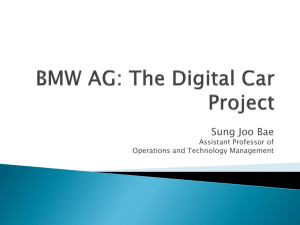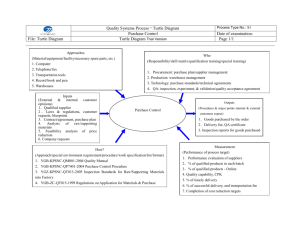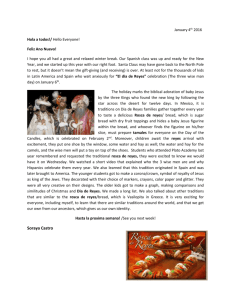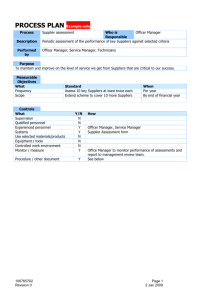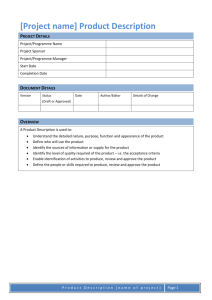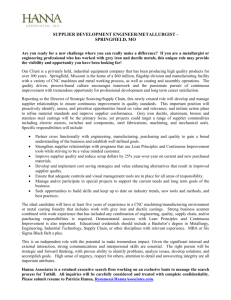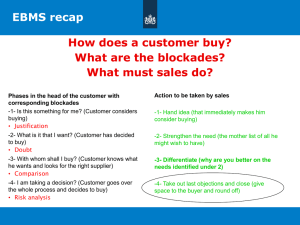SECTION 4.2 – DEFINITIONS ***** APPENDIX ***** APPLICATION
advertisement
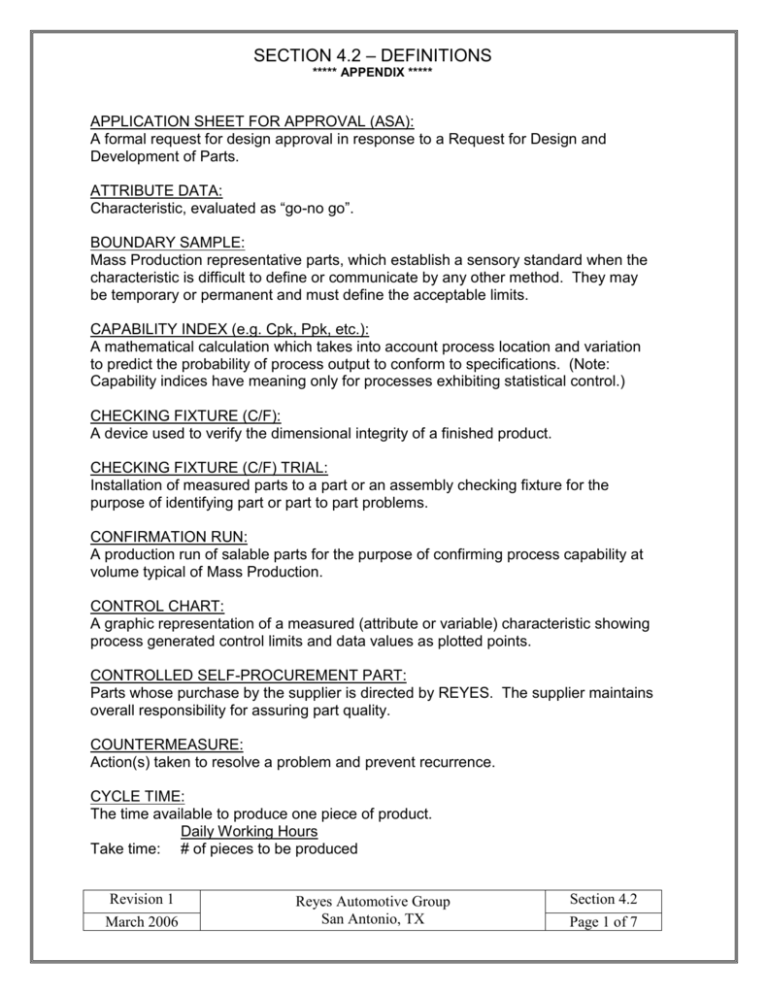
SECTION 4.2 – DEFINITIONS ***** APPENDIX ***** APPLICATION SHEET FOR APPROVAL (ASA): A formal request for design approval in response to a Request for Design and Development of Parts. ATTRIBUTE DATA: Characteristic, evaluated as “go-no go”. BOUNDARY SAMPLE: Mass Production representative parts, which establish a sensory standard when the characteristic is difficult to define or communicate by any other method. They may be temporary or permanent and must define the acceptable limits. CAPABILITY INDEX (e.g. Cpk, Ppk, etc.): A mathematical calculation which takes into account process location and variation to predict the probability of process output to conform to specifications. (Note: Capability indices have meaning only for processes exhibiting statistical control.) CHECKING FIXTURE (C/F): A device used to verify the dimensional integrity of a finished product. CHECKING FIXTURE (C/F) TRIAL: Installation of measured parts to a part or an assembly checking fixture for the purpose of identifying part or part to part problems. CONFIRMATION RUN: A production run of salable parts for the purpose of confirming process capability at volume typical of Mass Production. CONTROL CHART: A graphic representation of a measured (attribute or variable) characteristic showing process generated control limits and data values as plotted points. CONTROLLED SELF-PROCUREMENT PART: Parts whose purchase by the supplier is directed by REYES. The supplier maintains overall responsibility for assuring part quality. COUNTERMEASURE: Action(s) taken to resolve a problem and prevent recurrence. CYCLE TIME: The time available to produce one piece of product. Daily Working Hours Take time: # of pieces to be produced Revision 1 March 2006 Reyes Automotive Group San Antonio, TX Section 4.2 Page 1 of 7 SECTION 4.2 – DEFINITIONS ***** APPENDIX ***** DEFECT: Any state of unfitness for use or non-conformance to specification. DESIGNATED CONTROL CHARACTERISTIC [Pc]: Part characteristics that have a significant effect on performance, fit, function or workability on the completed vehicle and therefore require application of statistical measures for capability assessment and control. “DI” - DATA: Symbol or designation used to denote a data submission requirement, typically associated with Japan export inspection items (denoted by ). DIRECT RUN GOOD PARTS: A manufactured part which meets all drawing and Inspection Standard requirements without the need for repair. DIRECT SUPPLY (CONSIGNMENT) PARTS: Parts which are purchased by REYES from a “designated” supplier, and sold to a supplier for use. REYES Quality maintains overall responsibility for assuring part quality. ENGINEERING CHANGE OR REQUEST (ECI / ECR): ECI – A change made by REYES or the end customer concerning the design drawings and is forwarded to the supplier by means of the Engineering Change Instruction. ECR – A change requested by the supplier to REYES Design concerning design drawing details and / or part performance related items and is forwarded through the Purchasing Department by means of the Engineering Change Request. FAILURE MODE AND EFFECTS ANALYSIS (FMEA): An analytical tool to assess the overall risks of potential failures in design and / or processing. FIELD QUALITY PROBLEM REPORT (FQPR): A written notice issued to the supplier upon discovery of non-conforming parts on product already shipped from REYES. FINAL APPROVAL (FA): Acknowledgment that supplier has provided acceptable quality parts under Mass Production conditions. GAGE REPEATABILITY & REPRODUCABILITY (GRR): Revision 1 March 2006 Reyes Automotive Group San Antonio, TX Section 4.2 Page 2 of 7 SECTION 4.2 – DEFINITIONS ***** APPENDIX ***** A mathematical study of repeatability and reproducibility showing error as a percentage of tolerance and / or total variation. GENCHI GENBUTSU: Roughly translated to ‘go and see’. The term is used to describe the process of taking ownership of a problem or other issue by verifying through objective, handson evaluation. As a management tool, it describes the process of physically grasping actual conditions – going to see something in person to gather accurate information with which to make a decision. HIGH VOLUME PRODUCTION TRIAL (HVPT): Period of time for the supplier to conduct part trials to verify capability to produce quality parts at mass production capacity. HOSHIN KANRI: A planning tool used by management to align the activities of team members and departments to achieve itemized company goals and react quickly to changes in the market or other business conditions. IN-PROCESS CHECK FIXTURE (GAGE): Similar to check fixture but typically used during manufacturing (e.g. used to check subassembly vs. final assembly). INSPECTION STANDARD: A supplement to the production drawing, it contains information and requirements for supplier verification of products (i.e. tolerances and frequencies of inspection). JIDOKA: The ability of a machine to process to detect defects and stop automatically to prevent them from being reproduced or passed along. LEVEL ONE PART: A part or component which is assembled directly on to the vehicle. LIFE OF THE PART: From REYES’s start of new vehicle production, through OEM build-out requirements, including service parts requirements. LONG – TERM PROCESS CONTROL: The on-going control of a process through the use of statistical tools aimed at variation reduction and nominal targeting. MANUFACTURING QUALITY CHART (MQC): Revision 1 March 2006 Reyes Automotive Group San Antonio, TX Section 4.2 Page 3 of 7 SECTION 4.2 – DEFINITIONS ***** APPENDIX ***** (Control Plan) A document which follows the process flow and details the parameters and characteristics which must be controlled and the means of controlling them to assure output quality. MASS PRODUCTION: Parts made that are used for REYES’s volume start of production (SOP) that use Mass Production method, machine, materials, and personnel which have achieved both PA and PRC approvals. MASTER PART: A part manufactured and certified to Drawing nominal, to be used for problem solving. MASTER STANDARD (COLOR MASTER OR COLOR STANDARD): Standard for color, grain or fabric issued to the supplier by REYES. MODEL CODE: The model Code is the project development code and can be found under “Model” in the Drawing Title Block. REYES Quality: This is the group that is responsible for implementing and administering SQM requirements to the suppliers, and includes quality personnel (engineering and inspection) at the production plant. NON-CONFORMANCE (NON-CONFORMING PART): Product or material that does not meet specified requirements. (i.e. Part Inspection Standard, Drawing Standard, Boundary Sample, etc.) OFF-PRODUCTION PROCESS: A part made from a production process that is based on all Mass Production level inputs, including man (personnel), material, method, and machine. [Pc]: A symbol appearing on an Inspection Standard, denoting a designated control characteristic identified as requiring process control measures. PART APPROVAL (PA): A document signifying that the supplier has demonstrated capability to produce limited volume parts produced from off-tool and mass production equivalent process, which meet specified quality requirements. Revision 1 March 2006 Reyes Automotive Group San Antonio, TX Section 4.2 Page 4 of 7 SECTION 4.2 – DEFINITIONS ***** APPENDIX ***** PART EVALUATION PLAN (PEP): The Supplier’s plan for testing and verifying parts / components meet all drawing and inspection standard requirements. POKAYOKE: A mistake proofing system or device that utilizes methods which prevent defects from being made and / or passed to the next process. PROBLEM FOLLOW SHEET (PFS): A record of quality and / or design problems, countermeasures, and follow-up items. PROCESS CAPABILITY: The level of conformity a process is capable of producing for a specified characteristic (e.g. dimension, color, weight, etc.). PROCESS CHANGE REQUEST (PCR): A written supplier request, to make any change to their manufacturing process, or sub-supplier, after achievement of Quality Readiness Checksheet (QRC). PROCESS CONTROL: Preventing the manufacturing of non-conforming products through data collection, analysis and feedback to the process. PROCESS FLOW DIAGRAM: A diagram that depicts the flow of materials through the process, including any rework, repair and audit operations. PRODUCTION TOOLING: Tooling capable of producing parts that meet production Drawing and Inspection Standard requirements at Mass Production volumes. PROVISIONAL APPROVAL: A document signifying acceptable submission of sample parts (produced off-tool / off-process using mass production materials) which have met all applicable quality requirements. QUALITY ASSURANCE PROJECT PLAN: A plan issued to the supplier by REYES, which specifies the supplier’s submission timing requirements for SQM documentation. QUALITY IMPROVEMENT REQUEST (QIR): A method of communicating to the supplier a request for any change which will improve the fit, function or workability of the part. This applies in those situations where the supplier is meeting specification or where the Inspection Standard is Revision 1 March 2006 Reyes Automotive Group San Antonio, TX Section 4.2 Page 5 of 7 SECTION 4.2 – DEFINITIONS ***** APPENDIX ***** unclear. In addition, may be used to communicate part non-conformances during Pilot Production. QUALITY TUNING REQUEST (QTR): The method used for communicating to the supplier a request for any change which will improve the fit, function, or workability of the part. This applies in those situations where the supplier is meeting specification or where the Inspection Standard is unclear. QUALITY PROBLEM REPORT / QUALITY PROBLEM INFORMATION (QPR / QPI): The method used for reporting significant quality non-conformance and requesting immediate countermeasure information from suppliers. QUALITY IMPROVEMENT REQUEST (QIR): The method used to communicate non-conformances that do not meet QPR criteria or to request investigation of a problem when the responsibility is unclear. QUALITY RESIDENT ENGINEER (QRE): A supplier’s technical representative assigned to work at REYES. REQUEST FOR DESIGN AND DEVELOPMENT OF PARTS (RDDP) (For Approval Drawings) A document issued by REYES specifying design and performance criteria and requesting a supplier to do actual design and development of parts and components. SPECIAL INSPECTION PLAN: The Special Inspection Plan defines the activities to monitor and control the quality and productivity of a new model Mass Production during the initial Mass Production stage (from SQCS to full production). The plan should focus on special inspection points in the process: To monitor and confirm countermeasures to problems and concerns found during Pilot Production Trials To confirm any late ECI’s To detect new problems which might occur due to sustained volume production STANDARIZED WORK: A tool usually documented in a step-by-step manner for maintaining productivity, quality and safety at specified levels. It provides a consistent framework for performing work at the designated taki daizen or continuous improvement through regular examination and revision. TEN TO ONE RULE (10 TO 1, for gage construction) Revision 1 March 2006 Reyes Automotive Group San Antonio, TX Section 4.2 Page 6 of 7 SECTION 4.2 – DEFINITIONS ***** APPENDIX ***** Allowance of 10% of the part characteristic’s tolerance for gage construction accuracy (i.e. part tolerance = .4mm, gage construction tolerance = 0.4mm). TUNING: Minor part modifications, usually at the final stages of a program’s development, to produce acceptable fitting for trim parts. Tuning is also performed to improve a part’s workability. VARIABLE DATA: Results of readings taken on features which can be physically measured and reported as numerical values. WARRANTY RETURN PARTS: The actual parts returned by the dealer in a warranty claim. VEHICLE DEVELOPMENT STAGES: 1. PROTOTYPE: The supplier produces parts based on prototype drawings, which are evaluated on completed assemblies to assure design performance of a new model. 2. PILOT PRODUCTION TRIALS a. PARTS FITTING: Static evaluation, involving parts produced from Production Tooling fitted to the checking fixture and / or assembly. b. ASSEMBLY TRIALS: Both static and dynamic evaluation of parts, fitted to the assembly. 3. QUALITY CONFIRMATION STAGE (QCS) The QCS is just prior to SOP, where process, part, and completed assembly quality are confirmed in accordance with the Special Inspection Plan. Parts produced during this stage will be installed onto salable assemblies. 4. START OF PRODUCTION (SOP) When supplier shipments meet the production volume as required by REYES. Revision 1 March 2006 Reyes Automotive Group San Antonio, TX Section 4.2 Page 7 of 7

